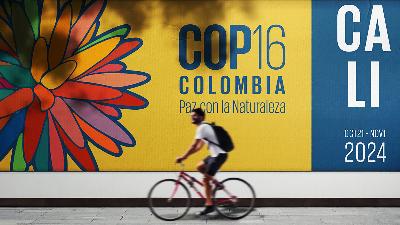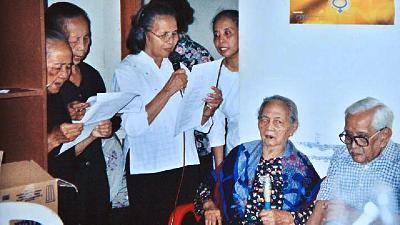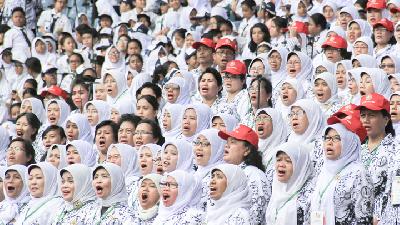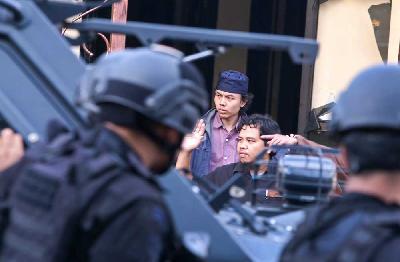The Absence of Ministers at COP16 CBD
Indonesia’s delegation at COP16 CBD in Cali, Colombia, is not led by a minister. Biodiversity funding is at risk of not being agreed upon.
maaf email atau password anda salah

Indonesia’s delegation at COP16 CBD in Cali, Colombia, is not led by a minister. Biodiversity funding is at risk of not being agreed upon.

Former chairperson of the Indonesian Women’s Movement left the history of 1965 behind upon her release from prison. Umi Sardjono did not say much about the bloody event of September 30, 1965.

AUGUST 6, 1945.

A research conducted by the Center for Islamic and Social Studies (PPIM) of Syarif Hidayatullah State Islamic University has indicated that the majority of Muslim teachers in Indonesia are intolerant of other religious adherents. Based on a PPIM survey of 2,237 teachers, those maintaining the intolerant view constituted 63.07 percent of respondents. “The research aims at examining the pluralist view and attitude of school and madrasah (Islamic school) teachers in Indonesia,” said PPIM Executive Director Saiful Usman last Tuesday.

Detainees and convicts from terrorism cases jailed in the Salemba Detention Facility of the National Police's Mobile Brigade Command Headquarters in Kelapa Dua, Depok, West Java, rioted and attacked police guards and members of the Special Counter-Terrorism Unit on Tuesday last week. After taking possession of firearms, rifles, and explosives which they took from officers and the evidence room, they held six members of the Special Counter-Terrorism Unit hostage and took over the facility for 36 hours. The rioting inmates, numbering over a hundred, surrendered after being surrounded by thousands of police. Six people died during the tension-filled incident: five police officers who had been taken hostage, and one inmate.

The two-day 'National Symposium on Dissecting the 1965 Tragedy: A Historical Approach' last week got nationwide and international attention.
It was, after all, the first time that the government hosted a forum to openly discuss and debate the mysterious and dark events of 1965.

Malaysian Attorney-General Tan Sri Mohamed Apandi Ali has declared there was no sufficient evidence to indict Prime Minister Najib Razak over allegations of receiving illicit money worth US$681 million. He said the funds in Najib's personal account were donations from the Saudi royal family and that some of them had already been paid back.
Last Tuesday, as a result, Malaysia's Kedah State Chief Minister Mukhriz Mahathir tendered his resignation. The son of former Premier Mahathir Mohamad said he was aware of waning public support after falling out with the United Malays National Organization (UMNO) leader.

The International People's Tribunal 1965 a hearing last week on crimes against humanity in Indonesia following the 1965 political upheaval held in the Dutch capital of The Hague, impacted three distinct groups. The first are the condemned and the vilified, senior military officers and government officials, and even a few historians clinging to tired old slogans about 'latent dangers of communism'.
The second group are those who regard the tribunal as little more than a game, not worth their time. The third group are people who believe that the tribunal is an effort to record the facts, which in turn would lead to pressure aimed at a United Nations resolution.

It is only a month before the closing of company books for 2015. In retrospect, it has been quite a dismal year. In January, there were high expectations, being the start of President Jokowi's first year in office. But by the year-end, the results were disappointingly far below expectations. This year's economic growth is expected to reach only 4.8-5.0 percent, in contrast to the 6.0 percent target set by the new administration. The Rupiah and the Jakarta Composite Index (JCI), which began the year, respectively at Rp12,500 per US$ and 5,200 points, dropped considerably, settling at Rp13,600 per US$ and 4,500 points by year-end. With sluggish economic growth, businesses have been forced to adjust downward this year's revenue targets. Along with the decline in sales, companies have been busy cutting costs, which at times hurt employment. Unfortunately, the cost cuts are rarely able to match the drop in revenue. As a result, profits have narrowed across the board.
The follow-up question is whether our economy has reached its lowest point and that by next year it should start to recover? In various economic seminars towards year-end, numerous experts are facing difficulty in assessing next year's outlook. Even the optimistic scenario predicts this year's sluggishness will extend till the first half of the year and the recovery to take place only after mid-year. The problem, they argue, is that the level of volatility or uncertainty remains high.

A few months ago, cases of Indonesian migrants workers in Hong Kong being abused by their employers came to light, such as the plight of Erwiana Sulistyaningsih and Elis Kurniasih, who died accidentally in an overcrowded shelter. "We need to have a system to deal with those bad cases," said Emily Lau, 63, a member of the Hong Kong Legislative Council and chairperson of the Democratic Party.

QUITE a few critics have expressed their doubts about the capacity of Muhammad Prasetyo as attorney general. Based on his tenure as deputy attorney general for general crimes between 2005 and 2006, he was regarded as an average performer. Add to that, the fact that he later became a full-time politician.

The recent Sixth UN Global Forum on the Alliance of Civilizations, which is aimed at mobilizing action against extremism through the forging of international, intercultural and interreligious dialogue, brought together world leaders and luminaries to Bali, venue of the conference. Among them was 60-year-old John Ashe, an Antiguan national who currently chairs the 68th United Nations General Assembly. Ashe, who holds a doctorate in bioengineering, is no stranger to global affairs, having been involved with the UN since 1989, at first working in his country's permanent representative office and subsequently serving in various UN agencies and as his country's ambassador, before taking up his current posting. He spoke to Tempo English reporter, Yuli Ismartono, on a number of global issues. Excerpts:

The central government and the Tuban administration are in dispute over the laying of a pipeline that will bring oil out from the Cepu Block, Bojonegoro, and the Tuban Block. Targeted oil production of as much as 960,000 barrels per day is threatened. Lobbying by several state institutions was able to crush the Tuban Regent and on Thursday this week the license will be issued.

Attempts to bring to trial cases of human rights violations during the 1965 tragedy still have a long way to go. Suharto somehow managed to remain out of the justice system’s reach.

More than 3.6 million cubic meters of timber are cut down each year in Papua, Indonesia’s last virgin forest redoubt.

ENVIRONMENTAL experts say that Jakarta is committing ecological suicide. The air quality in Indonesia’s capital city has become so bad that in 2006 the World Health Organization (WHO) warned that Jakarta had become the third most-polluted city in the world after Mexico City and Bangkok. In one year of living in Jakarta we only enjoy clean air for 22 days, 223 days of medium-quality air, 95 days breathing unhealthy air and four days of extremely unhealthy air. Around 80 percent of Jakarta’s air pollution is caused by vehicle exhaust emissions and 20 percent from industry.
During the massive floods last February, around 69 percent of the city was inundated. During a similar disaster in 2002, “only” around 25 percent was submerged. And during the dry season Jakarta runs short of water. It turns out that the ground level is sinking by 2-8 centimeters per year. According to the Indonesian Forum for the Environment (Walhi), seawater intrusion has already reached as far as the National Monument in Central Jakarta.
The largest cause for the slump in the quality of Jakarta’s environment is the increasing decline of open green space. As we know, open green space not only functions as the city’s lungs, but also as a buffer against all of the effects of environmental damage. This is truly regrettable because Jakarta once had a city administration plan that was very pro-environment, the 1965-1985 Jakarta Master Plan, which was also the city’s first master plan. Included in the design was the concept of a greenbelt which would be a part of open green space covering 37.2 percent of the city’s land area. Only around 10 percent of this open green space now remains.
In order to add some spice to the start of Jakarta Governor Fauzi Bowo’s term in office, in this issue Tempo is featuring a report on Jakarta’s city administration and green open spaces. We want to illustrate just how much Jakarta’s environment has changed—and for the negative. Some believe it is the time to halt this decline. One example is what is being done by residents such as Chaerudin at the Pesanggrahan River and Abdul Khodir in Condet (see Safeguarding Our Grandchildren’s Future). They are now enjoying a small slice of a greener Jakarta.

After 61 years of independence, the sense of communal harmony appears to be fading. Yet a handful of peacemakers tirelessly work on to sow the seeds of hope.

An entertainment tycoon and a close associate of Prime Minister Thaksin plans to take over Thailand’s two major newspapers, setting off questions over the future of press freedom in that country.

Koizumi’s plan to reform the Japanese Postal Service will be decided by the results of the parliamentary election on September 11. His opponents regard him as more evil than Hitler.

Junior Attorney General Hendarman Supandji has decided to replace the chief investigator of the Bank Mandiri loans scam case. The investigator is accused of taking too long to declare suspects in the case.

FRESH air was blowing in Vietnam, 1986. The country, torn by protracted war, decided to launch doi moi—perestroika Vietnam-style. Various doors, closed since the war, have now been opened with ‘lubricants’ added: deregulation, land reform, and a revived business climate. This step is expected to go a long way in changing the face of Vietnam. Is it true that doi moi has become an effective formula to change Vietnam, which is dubbed Asia’s ‘little dragon’? Here is a travel report from Tempo’s Mardiyah Chamim, who visited Hanoi, the capital of Vietnam, last month.
Intermezzo Tuesday, November 9, 2004 Edition

Controversy over investigations into the July 27, 1996 incident has again surfaced.

After propping up the Sukhoi deal with a US$26-million instant loan, Bukopin is rushing to provide credits to the commodity exporters.

Dangdut singer Inul Daratista is censured for her eroticism, leading to calls for a ban on her performances.

Karen Armstrong wrote The History Of God. She became more famous with the books Battle For God and Muhammad: A Biography Of The Prophet, which sold out all over the world. Today, this former nun has become a leading scholar on religions and God. She is known as a scholar who sympathizes deeply with Islam and is eloquent in her examination of religious fundamentalism. What is the essence of Armstrong’s thoughts? How does she view atheism? Although she’s an expert on Judaism, Islam, Catholicism and Buddhism, she often refers to herself as a ‘freelance monotheist’, meaning that she believes in God but does not practice any religion. Is this true? Read TEMPO’s exclusive interview with Karen Armstrong.

Karen Armstrong wrote The History Of God. She became more famous with the books Battle For God and Muhammad: A Biography Of The Prophet, which sold out all over the world. Today, this former nun has become a leading scholar on religions and God. She is known as a scholar who sympathizes deeply with Islam and is eloquent in her examination of religious fundamentalism. What is the essence of Armstrong’s thoughts? How does she view atheism? Although she’s an expert on Judaism, Islam, Catholicism and Buddhism, she often refers to herself as a ‘freelance monotheist’, meaning that she believes in God but does not practice any religion. Is this true? Read TEMPO’s exclusive interview with Karen Armstrong.

The lack of a citizen army gave birth to a ‘caste of paid military officers.’ Indonesians, however, are more than willing to defend their country.

His experience in the theater makes Jeremias Nyangoen mature in dealing with acting. This leads him to be Tempo’s Best Director.

A letter about the wayang philosophy.

Sanggar Taruna Krida Rasa teaches Malang’s children and teenagers the art of puppeteering. The studio hopes to preserve wayang theater.

The Sang Hyang Seri company was reported to have been responsible for a program to create paddy fields in Ketapang, West Kalimantan. But out of a targeted 100,000 hectares, only 100 hectares were cultivated. "Why was it reported as fictitious? We always submitted an accountability report," said Ahmad Yani, chief of Sang Hyang Seri's internal security unit, speaking to Tempo reporters Gustidha Budiartie and Ayu Prima Sandi at his office last Thursday.

Wayang Potehi of Java
By Ardian Purwoseputro
Publisher: Afterhours Books 2014
ISBN 978-602-97507-9-9
The fitting name for Indonesian-born Chinesethe country's significant and largest ethnic minorityis peranakan (children of the Indies), a group that has evolved their own customs, law, dialect, cuisine and performing arts, all of which have become not just the heritage of the country's Chinese citizens but that of every Indonesian.
Among the most beloved cultural icons that Chinese-Indonesians have given to the country is potehi, a unique form of puppet theater featuring puppets-in-the-round. This ancient traditional theater form, which epitomize Chinese culture, is based on ancient myths and legends. Thanks to the exposure given now to this artistic legacy, Wayang Potehi is one of the best examples of Indonesia's interfaith harmony and cultural diversity.

Home industries in Mayangan are producing car and motorcycle spare parts for both local and export markets. Government support is needed to help them expand.

Paulus Ronald Bogar was feeling happy late last July. His project '500 Names for NTT-Village Library' had racked up Rp53 million on the website, kitabisa.com. "I was so happy and moved," he told Tempo English two weeks ago. Ronald, who studies international relations at Padjadjaran University, is the Coordinator of the NTT Youth Project.
He realized that, at last, he would be able to fulfill the needs of his Village Library project, which had already established five villages in Sikka Regency, East Nusa Tenggara (NTT) Province: Ojang, Bangkoor, Poma, Dewa Wolo Dhesa and Nita. Since the program's inception he and his friends had badly needed funds for the purchasing of bookcases, tables, and other library needs.
Independent journalism needs public support. By subscribing to Tempo, you will contribute to our ongoing efforts to produce accurate, in-depth and reliable information. We believe that you and everyone else can make all the right decisions if you receive correct and complete information. For this reason, since its establishment on March 6, 1971, Tempo has been and will always be committed to hard-hitting investigative journalism. For the public and the Republic.